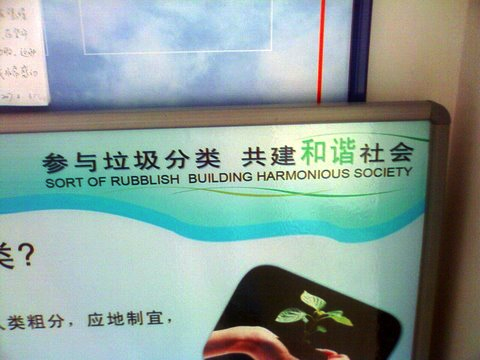Sort of rubblish
« previous post | next post »
Back in 2009, somebody (unfortunately I forget who it was) sent me this photograph of a sign in Beijing:

Apparently these signs were posted all over Beijing during the Olympics as part of an effort to spruce up the city.
The line at the top reads:
cānyù lèsè fēnlèi 参与垃圾分类
("participate in the sorting of rubbish")
gòngjiàn héxié shèhuì 共建和谐社会
("together build a harmonious society")
Many Language Log readers are undoubtedly aware of the irony of héxié 和谐 ("harmony; harmonize") — here emphasized in large, green characters — as used in current parlance, particularly as an adversative passive verb:
- "Peace and Harmony " (10/16/15)
- "High-speed railroaded" (2/12/11)
- China Digital Times Harmonious Society Archives
- "Word of the Week: River Crab" (3/21/12)
But there are two other aspects of the language on the sign that are even more interesting.
The first is fēnlèi 分类 ("classify; divide into categories"), which comes out as "sort of", which I find to be quite charming.
The second, which really piques my curiosity, is the spelling "rubblish" for "rubbish".
The equivalent Chinese is lèsè (Taiwan) / lājī (PRC) 垃圾 ("garbage; refuse; waste; rubbish; trash").
Amazingly, "rubblish" yielded 36,100 ghits when searched on 8/19/09 and still received 32,600 ghits when I searched it yesterday (6/19/15).
I read through several hundred of the entries obtained by the Google search, and they occur all over the world, but not in formal media, only in casual settings, Chinese advertisements, etc. This makes me wonder whether "rubblish" is a not uncommon typing error, a sociolectal variant, a phonological glitch that spontaneously arises in undisciplined speech, or due to some other factor that is beyond my ken. I'm stumped.
Eric P Smith said,
June 20, 2015 @ 10:45 am
I think it's phonotactic. As well as 391 hits for "rubblish", Google gives 271 hits for "refurblish" and 189 hits for "cabblage". (These are the actual number of hits, not the Google headline figure, which is always grossly inflated.)
Victor Mair said,
June 20, 2015 @ 11:54 am
@Eric P Smith
Great! The phonotactic explanation makes sense to me. I think my "phonological glitch" is a corollary of the same phenomenon; I was striving to say the same thing.
Ben Zimmer said,
June 20, 2015 @ 12:39 pm
For some, "rubblish" may be an eggcorn-y reshaping influenced by "rubble."
Victor Mair said,
June 20, 2015 @ 1:39 pm
Excellent, Ben! That works too.
David Morris said,
June 20, 2015 @ 9:51 pm
Rubblish is the distinctive variety of English spoken in Rubbland.
Observation said,
June 21, 2015 @ 12:12 am
It seems to me that a L2 speakers are likely to learn the word 'rubbish' before they learn 'rubble', though. I think the phonological explanation is more likely. In Hong Kong, many people insert an extra /l/ between a palato-alveolar fricative or affricate and an /i/.
An example of this is 'lengthly' (even if they know the correct spelling). http://languagelog.ldc.upenn.edu/nll/?p=3202
The case here may be different for L1 Mandarin speakers. Maybe they have a tendency to insert an /l/ between stops and /i/? (While the 'i' in rubbish is an /ɪ/, Chinese speakers are often incapable of pronouncing /ɪ/, and are likely to substitute it with /i/.)
shubert said,
June 21, 2015 @ 6:41 am
I guess it is caused by an effect of Echoic memory, one of psychological terms, by Pinyin of lese, l-l connection.
K Chang said,
June 21, 2015 @ 11:29 am
Wonder if people from Hong Kong (and may have encountered 'rubbish' in their more British education) would have the same problem? I certainly didn't, but I'm a bit of outlier.
richardelguru said,
June 21, 2015 @ 11:35 am
But surely Rubblish is the non-IE language spoken by Barney and Betty.
They actually spoke Old or Middle Rubblish though Bamm-Bamm is considered to have spoken Early Modern…
Observation said,
June 21, 2015 @ 11:41 am
@shubert: But this was found in the Mainland, not Taiwan…
shubert said,
June 21, 2015 @ 12:53 pm
@Observation: like your post. But the sign is ("laji") in mainland.
January First-of-May said,
June 21, 2015 @ 4:31 pm
For me, the phrase "sort of rubblish", while clearly far from normal English, unambiguously means "slightly similar to rubble".
As it happened, on first glance, I did think of the word "rubblish" as a typo for "rubbish", but then I noticed the word "building" immediately after, and decided that it must have been another case of weird Chinglish grammar instead.
Had to read almost the entire rest of the article to figure out that it was, in fact, just as I thought initially, a typo for "rubbish".